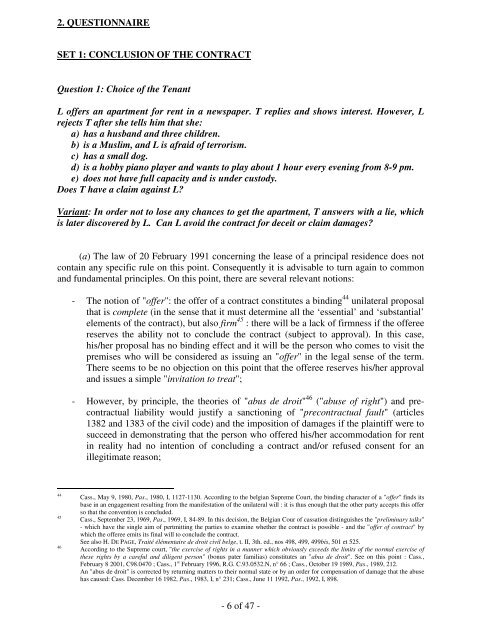- 1 of 47 - BELGIUM Catherine DELFORGE and Ludivine ...
- 1 of 47 - BELGIUM Catherine DELFORGE and Ludivine ...
- 1 of 47 - BELGIUM Catherine DELFORGE and Ludivine ...
You also want an ePaper? Increase the reach of your titles
YUMPU automatically turns print PDFs into web optimized ePapers that Google loves.
2. QUESTIONNAIRE<br />
SET 1: CONCLUSION OF THE CONTRACT<br />
Question 1: Choice <strong>of</strong> the Tenant<br />
L <strong>of</strong>fers an apartment for rent in a newspaper. T replies <strong>and</strong> shows interest. However, L<br />
rejects T after she tells him that she:<br />
a) has a husb<strong>and</strong> <strong>and</strong> three children.<br />
b) is a Muslim, <strong>and</strong> L is afraid <strong>of</strong> terrorism.<br />
c) has a small dog.<br />
d) is a hobby piano player <strong>and</strong> wants to play about 1 hour every evening from 8-9 pm.<br />
e) does not have full capacity <strong>and</strong> is under custody.<br />
Does T have a claim against L?<br />
Variant: In order not to lose any chances to get the apartment, T answers with a lie, which<br />
is later discovered by L. Can L avoid the contract for deceit or claim damages?<br />
(a) The law <strong>of</strong> 20 February 1991 concerning the lease <strong>of</strong> a principal residence does not<br />
contain any specific rule on this point. Consequently it is advisable to turn again to common<br />
<strong>and</strong> fundamental principles. On this point, there are several relevant notions:<br />
- The notion <strong>of</strong> "<strong>of</strong>fer": the <strong>of</strong>fer <strong>of</strong> a contract constitutes a binding 44 unilateral proposal<br />
that is complete (in the sense that it must determine all the ‘essential’ <strong>and</strong> ‘substantial’<br />
elements <strong>of</strong> the contract), but also firm 45 : there will be a lack <strong>of</strong> firmness if the <strong>of</strong>feree<br />
reserves the ability not to conclude the contract (subject to approval). In this case,<br />
his/her proposal has no binding effect <strong>and</strong> it will be the person who comes to visit the<br />
premises who will be considered as issuing an "<strong>of</strong>fer" in the legal sense <strong>of</strong> the term.<br />
There seems to be no objection on this point that the <strong>of</strong>feree reserves his/her approval<br />
<strong>and</strong> issues a simple "invitation to treat";<br />
- However, by principle, the theories <strong>of</strong> "abus de droit" 46 ("abuse <strong>of</strong> right") <strong>and</strong> precontractual<br />
liability would justify a sanctioning <strong>of</strong> "precontractual fault" (articles<br />
1382 <strong>and</strong> 1383 <strong>of</strong> the civil code) <strong>and</strong> the imposition <strong>of</strong> damages if the plaintiff were to<br />
succeed in demonstrating that the person who <strong>of</strong>fered his/her accommodation for rent<br />
in reality had no intention <strong>of</strong> concluding a contract <strong>and</strong>/or refused consent for an<br />
illegitimate reason;<br />
44 Cass., May 9, 1980, Pas., 1980, I, 1127-1130. According to the belgian Supreme Court, the binding character <strong>of</strong> a "<strong>of</strong>fer" finds its<br />
base in an engagement resulting from the manifestation <strong>of</strong> the unilateral will : it is thus enough that the other party accepts this <strong>of</strong>fer<br />
so that the convention is concluded.<br />
45 Cass., September 23, 1969, Pas., 1969, I, 84-89. In this decision, the Belgian Cour <strong>of</strong> cassation distinguishes the "preliminary talks"<br />
- which have the single aim <strong>of</strong> pertmitting the parties to examine whether the contract is possible - <strong>and</strong> the "<strong>of</strong>fer <strong>of</strong> contract" by<br />
which the <strong>of</strong>feree emits its final will to conclude the contract.<br />
See also H. DE PAGE, Traité élémentaire de droit civil belge, t. II, 3th. ed., nos 498, 499, 499bis, 501 et 525.<br />
46 According to the Supreme court, "the exercise <strong>of</strong> rights in a manner which obviously exceeds the limits <strong>of</strong> the normal exercise <strong>of</strong><br />
these rights by a careful <strong>and</strong> diligent person" (bonus pater familias) constitutes an "abus de droit". See on this point : Cass.,<br />
February 8 2001, C98.0<strong>47</strong>0 ; Cass., 1 st February 1996, R.G. C.93.0532.N, n° 66 ; Cass., October 19 1989, Pas., 1989, 212.<br />
An "abus de droit" is corrected by returning matters to their normal state or by an order for compensation <strong>of</strong> damage that the abuse<br />
has caused: Cass. December 16 1982, Pas., 1983, I, n° 231; Cass., June 11 1992, Pas., 1992, I, 898.<br />
- 6 <strong>of</strong> <strong>47</strong> -

















